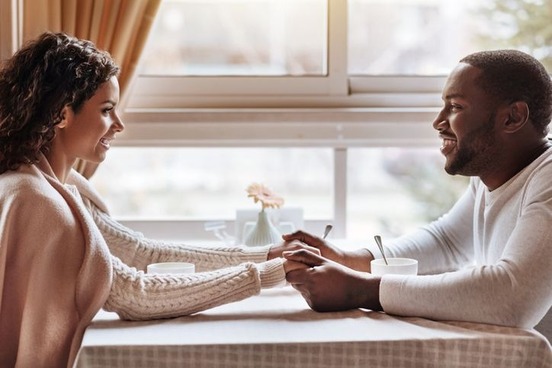
Goo-goo Eyes
Goo-goo is seemingly one of a metric ton of synonyms for loving and affectionate in English. It’s almost always encountered in the phrase “goo-goo eyes,” implying a foolishly sentimental, romantic, or amorous glance.
Brandon is a man on a mission. He pulls Serene for a chat right away, and they both immediately start “vibing,” as the kids (probably no longer) say. … They both giggle and give each other goo-goo eyes, and before you know it…
— Kristen Baldwin, Entertainment Weekly, 27 Sep. 2022
While it might sound like baby talk, goo-goo is believed to be an alteration of goggle, meaning “protuberant” or “staring” (think of a cartoon animal’s eyes bulging out of its head with hearts instead of pupils, accompanied by the blast of an old-timey car horn).

Apple of One's Eye
Since the pupil is essential to vision, it was held to be something very precious. Thus, when you call someone or something the "apple of your eye," you are telling them that they are cherished. In the past, the idiom actually referred to the actual pupil of the eye because it was viewed as a round, solid object comparable to an apple.
Having carefully observ'd the Eyes of several Fishes … I found that the … Pupil or Apple of the Eye, was very flat, like those in Human Creatures.
— Philosophical Transactions, 1705
The phrase is connected to the Bible, in which it appears in books of the Old Testament: Deuteronomy, Psalms, Proverbs, and Lamentations. The first use of the phrase appears in Deuteronomy, which reads "He found him in a desert land, and in the howling waste of the wilderness; he encircled him, he cared for him, he kept him as the apple of his eye." A more literal translation of the original Hebrew biblical text is actually "little man of his eye," which probably refers to the reflection of oneself that one sees in the eye of another person. In early English translations of the Bible, however, the phrase appears as "apple of his eye." This probably developed from the Anglo-Saxon use of the word æppel for "pupil" as well as for "apple." Thus, the phrase developed into "apple of one's eye" and retained the meaning of something treasured.
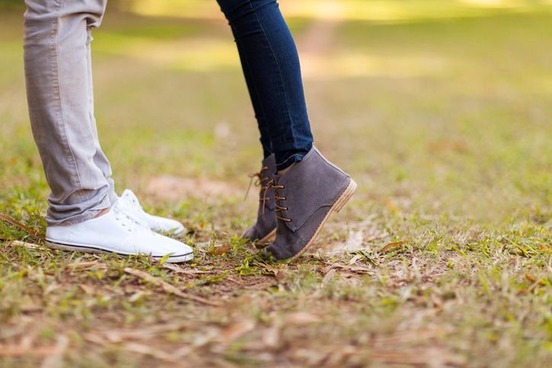
Puppy Love (and Calf-love)
The term puppy love is used for those romantic feelings of love that are felt between young people and are not considered to be real love by more experienced adults (despite Paul Anka’s protestations in his 1960 hit “Puppy Love”). It dates to the early 19th century, but puppy-lover used in similar contexts has been traced to the 17th century.
Babyface has spent a lifetime writing love songs with his inner child in mind. Growing up in Indianapolis in the 1960s, the producer-songwriter born Kenneth Edmonds was so enamored with the idea of romance that, decades later, he would tap into those sacred adolescent emotions whenever he created a record. “I would write songs and try to remember those feelings of puppy love,” he explains over Zoom, his eyes hidden behind reflective shades he never removes. “It was much more powerful than adult love, when there are many more complications. We were naive. We didn’t know everything. And it was nice to not know everything.”
— Clover Hope, Pitchfork, 3 Oct. 2022
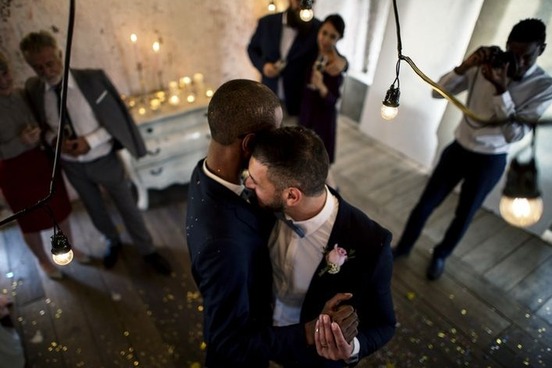
Head Over Heels
Part of the appeal of this odd phrase is its lack of logic; the head is, after all, normally over the heels. It comes from the somewhat more logical phrase “heels over head,” which is first recorded circa 1400. The variant “head over heels” began to circulate in the 1600s, and it seems to have occurred through an error. Nevertheless, common use has made it acceptable, and it has superseded its predecessor. Besides referring to, in an illogical manner, a somersault or being upside down topsy-turvy, “head over heels” can mean “very much” or “deeply,” as in “He is head over heels in love,” or “very much/deeply in love” as in “She went head over heels for him.”
Is there anyone who hasn’t faced a moment when, looking back at some lover we were mad for, head over heels for (phrases which point to the problem at hand), the question arises: what the hell was I thinking?
— Robin Kirman, LitHub.com, 24 Feb. 2022

Heartthrob/Sweetheart
The word heart began pulsating in Old English as the name for the organ in the chest that pumps blood through veins and arteries. In the 16th century, the noun throb began beating. (The verb was already palpitating in the sense of "to pulsate or pound with abnormal force.") Early uses of the noun include references to spasms of pain (especially in childbirth) or the catching of breath, or even a sigh.
Still as she stood, she heard with grievous throb / Him grone, as if his hart were peeces made, / And with most painefull pangs to sigh and sob….
— Edmund Spenser, Faerie Queene, 1590
The verb senses associated with the heart were heard in the 14th century.
The term heartthrob originally referred, unsurprisingly, to the pulsation of the heart in the 18th century and later to sentimental emotion. In early 20th-century American English, heartthrob named a person or thing that aroused romantic feelings or with whom one was infatuated; nowadays, it is chiefly applied to an attractive and usually young, famous man.
Heart also has an intimate relationship with sweet. Although heart has been openly paired (grammatically, as an open compound) with various other adjectives connoting love (such as dear and darling) since Old English, it began an intimate relationship with sweet, first in hyphenated form and then as a closed compound, as in the pet name sweetheart for a person you love very much, in the 16th century.

Bae
Bae is slang for “baby” or “sweetheart” and pronounced like “bay.”
Lizzo’s got a man at home, and he’s so good to her (or however the Chanté Moore song goes…). The superstar made that clear this week while sharing photos and video from a getaway with her mystery bae on Instagram.
— Victoria Uwumarogie, Essence, 9 Mar. 2022
Although bae may seem like a new word to some, according to our archives first appeared in print in1983, a year that also gave us ringtone, stressed-out, and onesie. Bae was added to our online dictionary in 2018, following a dramatic uptick in its recorded use.

Ship
Some relationships are actual, and some are vicarious. The latter are what led, about a quarter century ago, to the noun relationship being shortened to ship and used as a verb meaning “to wishfully regard (specific people or fictional characters) as being or having the potential to become romantically involved with one another.”
Caroline and Klaus’ passionate, nearly forbidden romance was one of the show’s [The Vampire Diaries] most beloved pairings. The sexual tension between the very bad boy and the good girl had fans shipping them, garnering them the nickname Klaroline.
—The Cheat Sheet (CheatSheet.com), 11 Dec. 2022
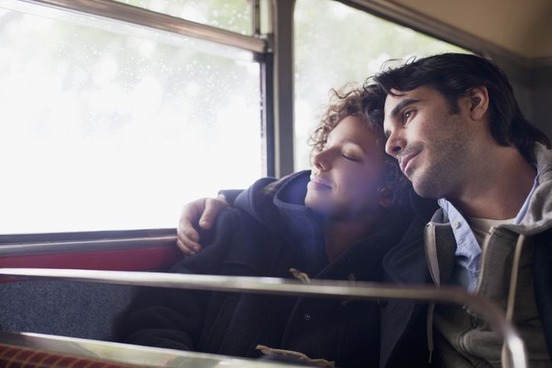
Canoodle
We define canoodle as “to engage in amorous embracing, caressing, and kissing.” Since it first appeared in the language around the mid-19th century, canoodle has most often been used humorously and playfully for public displays of affection by lovestruck couples (it’s also a favorite of gossip columnists).
In January 2021, Kourtney [Kardashian] was linked to Travis Barker. Since going public with their relationship, they’ve been canoodling all over the country. In October 2021, Barker proposed.
— Andrea Francese, CheatSheet.com, 21 Apr. 2022
Etymologists aren’t certain whence came canoodle. It may have formed from an English dialect noun of the same spelling (meaning “donkey,” “fool,” or “foolish lover”) which itself may be an alteration of the word noodle, meaning “foolish person.” That noodle, in turn, may come from noddle, a word for the head.

Shack Up
Both the noun and verb forms of [shack] arose as American slang in the late 1800s. The noun is suspected to be a back-formation of shackly, an adjective meaning “rickety” or “ramshackle.” The original sense of the verb was simply “to live in a shack.” The phrase “shack up,” first recorded in the early 1900s, often meant spending the night any old place, including, say, your mom’s house. Nowadays, however, “shack up” often carries a distinct, spicy connotation:
A viewer can spend most of this Polish drama [Into the Wind] waiting for a hook that never comes. The gloomy med student Ania (Sonia Mietielica) and what remains of her family go to a resort to cheer themselves up as they approach the five-year anniversary of Mom’s death, and she recovers some of her [joie de vivre]( https://www.merriam-webster.com/dictionary/joie%20de%20vivre] by shacking up with a hunky kitesurfing instructor (Jakub Sasak).
— Charles Bramesco, Vulture.com, 18 Feb. 2022
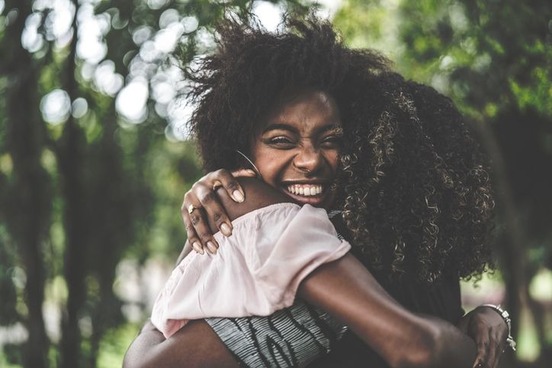
Main Squeeze
Squeeze has referred to a gesture of friendship and affection in the form of a handshake or hug since the 18th century. One’s “main squeeze,” however, was originally one’s boss or any person in charge.
I went in and asked the main squeeze o’ the works how much the sacque meant to him…
— George Ade, Artie, 1896
By the beginning of the 20th century, people began bragging about their “main squeeze”—that is, their primary (potentially beanie-loving) partner in romance.
You’ll never go wrong with getting your main squeeze another beanie to add to her collection.
— Kylee McGuigan, Popular Mechanics, 27 Jan. 2022

Language of Love
Learn the origins of words to tell your special someone, from 'amour' to 'aphrodisiac.'
SEE THE LIST >





